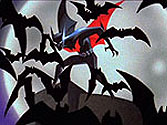 |
 The
Call
The
Call
Batman
joins the Justice League as a traitor is targeting the members.
Original Airdate: November
11 & 18, 2000
Episode # 50, #51
Rating: * * * 1/2
|
||
|
|
|
| Credits | Cast | |
Story by Paul Dini & Alan Burnett Teleplay by Rich Fogel & Hilary J. Bader (I) Teleplay by Stan Berkowitz (II) Directed by Butch Lukic Music by Kristopher Carter Animation by Koko/Dong Yang |
Will Friedle as Terry McGinnis Kevin Conroy as Bruce Wayne Shannon Kenny as Inque Jodi Benson as Aquagirl Wayne Brady as Micron Farrah Forke as Barda |
Chris McDonald as Superman Peter Onorati as Warhawk Lauren Tom as Green Lantern Tim Dang as The Driver Chad Ensnder as Father |
|
|
|
He’s a thief, an imposter, very nearly a cad. He’s lied to her, repeatedly, and replaced each uncovered lie with a new one. Her confidence in him is repeatedly shattered, betrayed. He and the audience both steel themselves for a stream of invective. Instead, she sighs and falls into his arms. "Absolutely nothing." (Remember, it’s Cary Grant we’re talking about.) It’s one of the wittiest and most cinematic swoons ever perpetrated. Now, you know what’s wrong with "The Call"? Plenty, if you’re keeping track of the trivial. The story makes absolutely no sense. The script cheats at every turn. Dead heroes return to life. Key motivations change at the drop of a plot device. Action sequence is piled on action sequence. Follow it too closely and you bark your shins on hairpin plot twists. None of it matters. This is one of the most polished pieces of bosh we’ve ever been served, a story that delights in surprise and misdirection for its own sake. It’s a tease from the very outset, as we watch one of the heroes in a battle to the death with a squad of laser-shooting robots, an energetic bout of the old slice-and-dice school of street fighting. Except it’s not life-and-death, but a simulation. In a tabletop stadium. Because it’s Micron, the 21st century Atom, fighting for very small stakes. Don’t believe everything you see, the sequence winks. Don’t believe it when Batman, chasing Inque, corners a pod of innocent seals in the city zoo. Don’t believe it when Superman says someone is trying to assassinate the other members of the Justice League. Don’t believe it when Warhawk perishes in a missile explosion. Because sooner or later the script is going to take it all back and replace it with a new story. Not that the new story will make any more sense than the old. The whole idea is to put off revealing that the ultimate plot is a pot of day-old beans–the old mind-controlling parasite trick–until the last possible moment, distracting us in the meantime with a lot of twists so insane they feel ad libbed. Smartly ad libbed to be sure, especially in the episode’s bravura set piece, a massive missile attack on Metropolis. That sequence contains some of the most beautifully realized bits of the series, beginning with a truly grand entrance by the JLU as they fly to the city's rescue, continuing as the tenants fall through the windows of a toppling skyscraper, and climaxing when Warhawk’s decapitated helmet hits the Batmobile dead on in the windshield. Of course, you may feel your affections have been trifled with. Does the plot have to be so outrageous or the surprises so gratuitous? It’s emotionally manipulative, as the initially truculent JLU members treat Terry with merciless suspicion and disdain. The closing shot is a blatant cheat. "I don’t want to join," a snow-bound Batman tells the JLU, and we get a tasteful fadeout as he walks back toward the (crippled) Batmobile. Tasteful, because it smilingly passes over the humiliating sequel to that lone gunslinger exit: "Uh, guys? Can I get a lift home? Superman broke my car." But pulp, like love, has its own law, and when the heart knows what it wants the wisest course is to let it have its own head. The ability of some stories to walk over a plot hole is something I’ve never quite understood–it’s the aesthetic equivalent of Roadrunner physics, and if I’ve learned anything from the Coyote it’s that when in doubt you should never look down. (That goes for the writers, too; "Curse of (the) Kobra" hasn’t any faith in its lack of conviction and tries to stay airborne by flapping its arms really hard, but the result is a colossal bellyflop.) Fortunately, "The Call" is so light and moves so quickly that it’s never in danger of losing altitude. I’ll admit, anyone with a bone to pick with "The Call" is going to find a lot to pick over. And I’m a nitpicker by nature, as is most anyone (I suspect) who’s willing to pick through this site and this review. It’s quite a catalog of complaints I’ve here compiled. And what, in my humble opinion, do they count for, in the end? "Absolutely nothing." |
|
|
|
|
Related
Episodes |
What
Others Are Saying ... |
|
|
| Back
to Blood Sport |
Forward
to
Countdown |